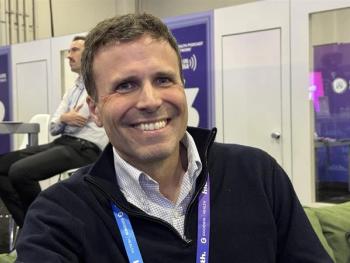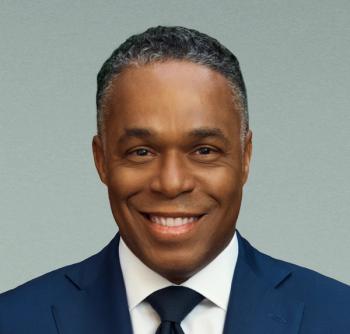
PX: The Top 2 Powerhouse Disruptors Entering Healthcare
These days it seems like everyone has set their sights on disrupting healthcare. Who's really making news, and who's just making noise?
Every day we hear a new announcement about a Silicon Valley startup or a pedigreed retail giant setting its sights on healthcare disruption. But what’s the easiest way to forecast who will actually make a difference?
According to our expert panel, you just need to look at their behavior today — it'll unveil tomorrow’s intentions.
The Top 2 Powerhouse Disruptors Entering Healthcare
A Healthcare Analytics News® Peer Exchange®
Segment 5/13
Kevin R. Campbell, M.D.: These days it seems like every big Silicon Valley name is working diligently to enter some area of health care. Amazon recently bought the digital pharmacy PillPack. Apple is working on electronic health records and wearable devices for the “connected patient.” Google is developing algorithms to detect diabetic retinopathy. There are companies like AliveCor that can record EKG [electrocardiogram] in real time. Out of all of what’s going on out there, what entity do you guys think is the most likely defining success? Colin, let’s start with you.
Colin Hung, BaSC: My money is on Amazon, for two reasons. One, I think they know more about you as an individual than anybody on the planet. They know your buying habits: They know when you buy stuff, and they know where you buy stuff. I think those data will become extremely valuable as we continue to move more into the social determinants of health. When we look at nutrition, when we look at all those things, Amazon’s got their hands on that information. When you add in all the medical information they could potentially have from PillPack and some of their other acquisitions, I think they’re going to have the most data, which is going to make a big difference.
The other thing about Amazon is that they put a huge focus on the customer. They do everything for the customer in terms of streamlining purchasing, offering things that you will like, and offering things that they understand you need and you want. My money is on Amazon for the reason that they understand us as individuals, and they actually have built an organization that really, truly innovates around the individual to make things so easy.
Kevin R. Campbell, M.D.: Jane, you’re our economist, so tell me what you think about these people moving in.
Jane Sarasohn-Kahn, M.A., MHSA: I’m with you, Colin. I think Amazon will be “a,” not just “an,” disruptor, particularly on the data front. Whole Foods, obviously. Everybody loves Prime. But I want to talk about a company that doesn’t get a lot of play on this issue of technology disruption in health, and that’s Walmart. The reason I bring Walmart up as an economist and a health economist is that I want to move the needle on chronic disease. I want to move the needle on weight and obesity. I want access. Walmart operates in a lot of rural areas and is a primary care provider in a lot of rural areas that don’t have access to GPs.
Walmart is very tech savvy. In their reorganization, while they’ve been very big, of course, in health and beauty—about 30% of their income—in front of the pharmacy, let’s not forget they’re a huge pharmacy at the back end as well. Behind the counter, they have their own kiosks that are picking up people’s blood pressure in the afternoons. They will try to acquire Humana, an insurer. Therefore, we can see this vertical integration between grocer, pharmacist, and health insurer. Humana just acquired a palliative care company for end-of-life care. Humana’s huge in Medical Advantage.
We are starting to move the needle on older patients. We are starting to move the needle on the people who have a bulk of the burden of chronic disease, who don’t have access to health care at a low cost. That makes my heart sing. I’m betting on Walmart as one of many of these players that might not get a lot of play.
Kevin R. Campbell, M.D.: John, you work with Google. What do you think Google’s role is in this whole space of disruption of health care?
John Nosta, B.A.: I think it’s a little bit more complicated. When I got my AliveCor EKG machine that I keep in my wallet, I got it from Amazon. But who was the innovator? Dave Albert was the innovator at AliveCor. I think about these large consumer groups, and I look at them in the context of innovation.
Innovation is a three-legged stool to me. There’s the lightning bolt, the cool stuff; there’s clinical development, where we do the trial, see if it works and make it clinically relevant; and thirdly, there’s market access. To me, Amazon (and potentially Google) lives on the market access side. But they don’t own innovation. With the exception of analytics, I haven’t seen an innovative product come out of Amazon, have you?
Kevin R. Campbell, M.D.: No. They’re great marketers.
John Nosta, B.A.: So, why do we hold them up as the definitive innovation company? I’m going to go back into pharmaceuticals. The pharmaceutical industry isn’t dead; it isn’t dying.
Geeta Nayyar, M.D., MBA: Did you just say that?
John Nosta, B.A.: The pharmaceutical industry is coming up with powerful innovations. They are really the bastion of academia and science coming up with CRISPR (clustered regularly interspaced short palindromic repeats) and immuno-oncology and personalized therapy. I’m not willing to give the farm to Amazon just yet.
Geeta Nayyar, M.D., MBA: I agree. I agree with both of you. Again, I’m a rheumatologist, so I love old people. Jane, you’re right, it’s about chronic diseases. Amazon is great. I’m a Prime member. But Walmart, that is something, right? With pharmaceuticals, there’s an opportunity. I really think that it’s fundamentally about access because you’ve got to be where there are consumers, and there are a lot of them on Amazon. Good for Amazon, but what about everybody else? When we look at economics, there’s a whole portion of the country that’s actually not on Amazon.
Jane Sarasohn-Kahn, M.A., MHSA: We can’t stay in a geek bubble. We have to really think about the n of everybody in healthcare, and there are so many underserved people. With health literacy, we can develop communication and education materials that are perfect for whatever people want. Let me add just one more building block to Amazon, and it’s important. You talked about innovation. Amazon web services, their clouds, have a whole lot—I almost used a bad word—of data: banking data, retail data, data from Phillips, data from Salesforce. Everybody’s working with the Amazon web service clouds, so don’t count that out on the analytic side. Data are the game. Amazon has a lot.
Colin Hung, BaSC: You’re right, maybe Amazon isn’t the grand innovator of a lot of things, and certainly they’re not going to do that on the clinical side. But one thing that I’m encouraged by with Amazon is that they’ve democratized pricing in a lot of industries. We knew exactly what it was going to cost for this book, and guess what, the book price is the same almost everywhere now. Why? Because it’s so easy to find out, and it has flattened prices. I’m hoping for that with some of the medical approaches that they’re going to use. They may not solve the drug pricing issue, but at least it will flatten it where it’s this price, and we now accept that it’s this price.
Jane Sarasohn-Kahn, M.A., MHSA: And transparency.
Geeta Nayyar, M.D., MBA: That’s right.
Colin Hung, BaSC: It’s transparent. I’m looking forward to that.
Geeta Nayyar, M.D., MBA: Even if Mom and Dad shop at Walmart, the kids that are often taking care of Mom and Dad are on Amazon.
Get the best insights in healthcare analytics
Related






































